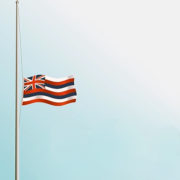2017 Hawai`i State Legislature Fails on Clean Energy Advancement
As the 29th session of the legislature draws to a close, the fifty-eighth Senate day of the sixty-day session ended with votes where no one could explain what happened. The irony of these votes reveal the underbelly of the legislature, which could explain why there are so few community people who come to testify anymore.
All conference committees had to finish their meetings by 6 p.m. In past years, the halls of the Capitol were packed as the final minutes wound down. But few people show up for the final showdown this year, and by 6 p.m., the halls were virtually deserted.
The legislature failed to fund rat lung research and prevention, voting-by-mail, and a number of energy bills. The Senate failed to confirm one of the most qualified commissioners in the history of the Public Utilities Commission. But the legislature is poised to pass a strange bill that would create guidance for the Public Utilities Commission.
Rat Lung is a parasitic infection, which can cause long-term health problems, including eosinophilic meningitis, temporary paralysis, and death. Cases on Maui and the Big Island are on the rise.
Snails and slugs can leave slime on vegetation, which when ingested, can cause serious harm to people. Representative Creagan, a physician from the Big Island, stated in conference committee that the infection attacks not only people, but also attacks dogs and horses.
Dr. Susan Jarvi, a researcher at the University of Hawai`i Hilo College of Pharmacy, has been leading efforts to understand rat lung. The Department of Health should get involved to stop the spread. Neither effort received funding because of a clash in personalities between different Senators.
Factionalized Democracy at 2017 Hawai`i State Legislature
Hawai`i has a low voter turnout rate. Corie Tanida of Common Cause Hawaii and Janet Mason of the League of Women Voters, have been leading an effort to increase the number of people who vote, by increasing the use of vote-by-mail. For the third year in a row, the bill died in conference committee.
SB 665 would have replaced tax credits for renewable energy systems, with a tax credit for property that has renewable energy systems. This would deal with the perceived problem of entities receiving multiple tax credits for the same property. Currently, energy storage only receives a tax credit if it is installed as part of a renewable energy package. Efforts have been made to expand the energy storage tax credit to those who already have renewable energy systems, and want to add energy storage to the mix.
Because the money committees refused to fund SB 665, the Senate Committee on Transportation and Energy left other energy bills on the table. This included SB 909 which would have addressed deficiencies in Hawaii’s fuel shortage response and energy emergency statutes in the event of an actual or potential energy supply disruption, and HB 1580 which would establish long-term goals to decrease and end the use of fossil fuel in ground transportation.
The nominee for the third seat (Thomas Gorak) on the Public Utilities Commission, was a person with four decades of energy and regulatory experience. Most energy stakeholders believe that this is exactly what Hawai`i needs right now to implement the policies of the legislature that will help Hawai`i reach our 2045 goal.
People who have gone to the Commission office, or attended Commission hearings, have remarked on the rise in the spirit and the energy of the staff. This was reflected in the number of staff members who signed onto letters of support, and who showed up during the nomination fight.
Energy stakeholders wondered why would the legislature impede progress on their own 2045 initiative? The confirmation hearing that took place for this nominee was ugly and filled with innuendo. The floor session last night was an example of factionalism where things were decided, votes were secured, and not one single person could explain why they opposed the nominee.
Hawaiian Electric Company staff, consultants, and lawyers, show up in mass, at every single energy event, including meetings, hearings, and conferences. But they were conspicuously absent from the nomination process, before the Senate Committee hearing, and during the Senate floor vote.
Ten Senators voted to support the nominee: Stanley Chang, Will Espero, Josh Green, Breene Harimoto, Les Ihara, Donna Mercado Kim, Karl Rhoads, Gil Riviere, Russell Ruderman, and Laura Thielen.
Fifteen Senators voted against the nominee: Rosalyn Baker, Donovan Dela Cruz, Kalani English, Mike Gabbard, Brickwood Galuteria, Lorraine Inouye, Kaialiʻi Kahele, Gil Keith Agaran, Michelle Kidani, Clarence Nishihara, Maile Shimabukuro, Brian Taniguchi, Jill Tokuda, Glenn Wakai, and Ron Kouchi.
The Senate and House reached agreement on a bill to create guidance for the Public Utility Commission.
SB 382 stated, “The purpose of this Act is to update the structure and operation of the commission to increase efficiency and effectiveness.” But the language of the bill suggests the opposite.
SB 382 would require the Legislative Auditor to conduct an audit of the Hawai`i Public Utilities Commission, that would include the “appropriateness…of current utility legislation.” Presumably, that includes SB 382.
SB 382 states that the Commission shall “align private interest with public interest through the proactive, aggressive pursuit of factual information and technical competency to result in fair and timely decisions and orders in pursuit of the public interest.”
Align generally means “to arrange things so that they form a line, or are in proper position.” Nowhere in state law, nor in the bill itself, is “private interest” define, so many wonder how can it be aligned with the public interest. The terms “technical competency” and “aggressive pursuit” are also not defined. Energy stakeholders wonder how “aggressive pursuit” is different from normal pursuit?
The words “aggressive” and “aggressively” appear just fifteen times in the Hawai`i Revised Statutes. The Hawaii Natural Energy Institute, and the Intra-island water ferry transportation system, must aggressively seek federal funds. The Agribusiness Development Corporation shall have aggressive and dynamic leadership leading an aggressive and dynamic agribusiness development program. The other twelve uses are in criminal code sections of law.
SB 382 states that the Commission shall “ensure reliability and delivery of all essential services provided by regulated entities at all times.”
Does that mean the Commission is liable for non-delivery? And delivery of what? Nowhere in state law, nor in the bill, is “essential services” defined. Is it a subset of all utility services?
SB 382 states that the Commission shall “provide oversight of resource planning efforts to ensure adequacy and resiliency to ensure essential services are available when needed.”
Nowhere in state law or in the bill is “resiliency” defined. National discussions have led to widely different interpretations: resiliency means the ability to grow, change, and/or bounce back.
Among Hawai`i policy makers, some think resiliency means reliability; others think it does not include reliability. Still others believe that it includes environmental sustainability and cultural protection.
SB 382 states that the Commission shall “strive for affordability for consumers while allowing regulated entities an opportunity to maintain reasonable earnings.”
This is the only one of the six principles which the Commission must merely strive, or attempt, to achieve something. Is affordability the least important principle?
April 29, 2017 Henry Curtis, Ililani Media




Leave a Reply
Join the Community discussion now - your email address will not be published, remains secure and confidential. Mahalo.